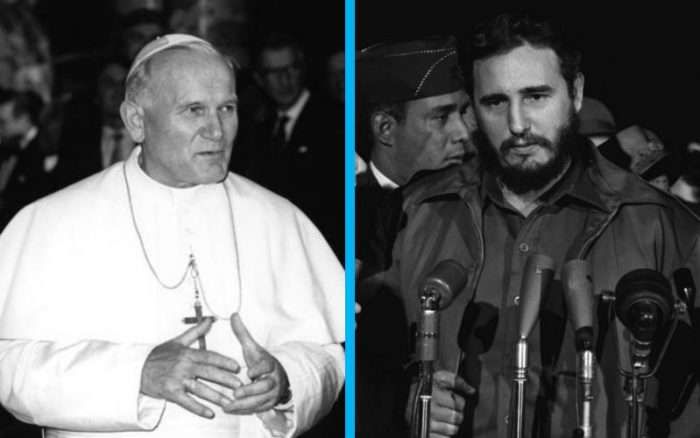Havana, Cuba, Dec 3, 2016 / 03:40 pm (Church Pop).- After Fidel Castro gained power in Cuba in 1959, he spent the next decade slowly imposing socialism on the country, including state atheism. In 1960, several Cuban Catholic bishops signed a letter re-affirming the Church’s long-standing rejection of communism and called for Catholics to reject it. In response, his government confiscated Catholic property and arrested Catholics.
Then, in 1969, he banned the celebration of Christmas. This ban on the celebration of one of the Church’s high holy days lasted for nearly three decades until 1998, when St. John Paul II successfully convinced him to remove the ban. Joaquín Navarro-Valls, John Paul II’s spokesman in the 1990s, recently shared the amazing story with Vatican Insider.
“I explained to him [Castro] that now that the date of [John Paul II’s] visit was set — for 21 January 1998 — it would be interesting if it were a great success,” Navarro-Valls shared. “‘Cuba needs to surprise the word,’ I told him. Fidel agreed.” “So I added something about the surprises the Pope was expecting. I asked Castro for Christmas, which was just around the corner, to be celebrated as an official holiday for the first time since the start of the Revolution.”
Here’s how Castro responded, according to Navvarro-Valls: “He said it would be very difficult as Christmas fell right in the middle of the sugar cane harvesting season. To which I responded: ‘But the Holy Father would like to be able to publicly thank you for this gesture once he lands in Havana.’
“After a long discussion, Castro finally said yes, although he did add: ‘But it could be for this year only.’ All I said was: ‘Great, the Pope will be grateful to you for this. And as for next year, we’ll see.’ “As we know, to this day, Christmas is still celebrated as a public holiday in Cuba.” You can read the full interview on Vatican Insider.
This article originally appeared on Churchpop.com. Reprinted with permission.

